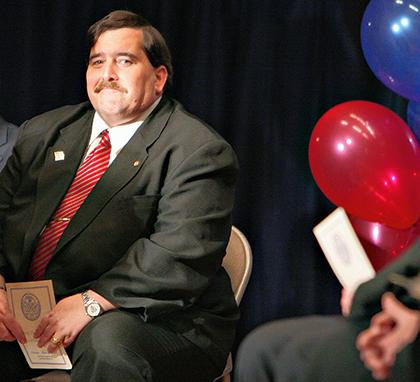By Jeremy Walsh
A week after Gov. David Paterson unleashed an ambitious ethics-reform agenda in his State of the State address, the state Legislature rolled out its own initiative.
Unlike Paterson’s proposals, the Legislature’s bill has the backing of government watchdog groups like the New York Public Interest Research Group, Citizens Union and the League of Women Voters. Democratic legislators hailed it as a move in the right direction.
“The Assembly and Senate have come together on comprehensive ethics reforms that will reduce the influence of lobbyists on state government and increase campaign finance requirements to help restore public confidence in our democratic process,” state Assemblyman Mike Miller (D-Glendale) said. “We hope the governor will join us in our efforts to make state government more responsible and transparent.”
But Paterson’s office scorned the legislators’ offering.
“The governor is stunned that legislative leaders would be so disrespectful to the public that only one week after he proposed a sweeping and real overhaul of the ethics system in Albany, they would try to pass this off as anything more than election year window dressing,” Paterson spokesman Peter Kauffmann said in a prepared statement.
The Legislature’s plan would create an ethics commission, an ethics investigation office, a commission on lobbying ethics and a commission to oversee the governor’s ethics. Each body would have an executive director appointed by a majority vote from both houses and limited to a three-year term. The bill does not specify the cost of establishing these positions.
Paterson’s plan called for a panel selected by the Legislature to appoint the members of the existing Public Integrity Commission, which would also gain enforcement power over campaign finance violations. The governor’s staffers were also unsure how much his proposed changes would cost.
The Legislature’s bill would expand the list of professional relationships elected officials would have to disclose and require the disclosure of consulting clients that are not exempt. In addition, lobbyists and clients of lobbyists would be required to disclose business relationships with the state.
The bill would increase financial disclosure requirements by splitting an existing category into two new categories on financial disclosure forms — amounts between $250,000 and $1 million and amounts of $1 million or more.
The Legislature also hopes to address campaign finance issues by creating an enforcement unit within the state Board of Elections and requiring that at least 35 percent of the board’s annual budget be dedicated to the unit.
The bill would also require that candidates with independent expenditures that cost more than $1,000 disclose who paid for the expenditure; increase the penalty for the failure to report to the state Board of Elections from $500 to $1,000; and add a $10,000 fine for the failure to file three or more campaign finance filings in an election cycle.
The bill did not include Paterson’s call for the establishment of a 4-to-1 public funds-matching system for state elections.
Reach reporter Jeremy Walsh by e-mail at jewalsh@cnglocal.com or by phone at 718-229-0300, Ext. 154.
































